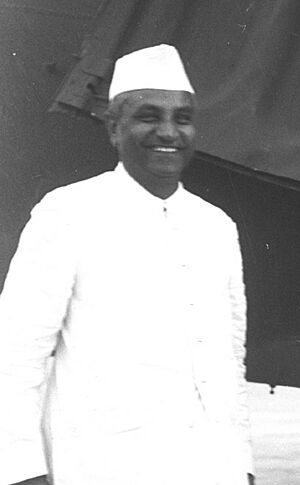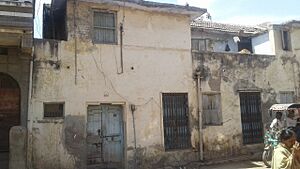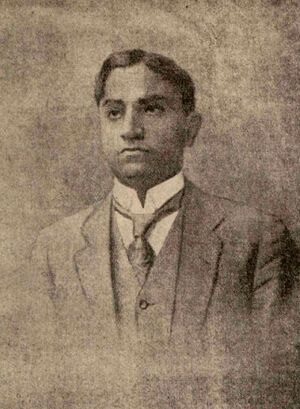Jivraj Narayan Mehta facts for kids
Quick facts for kids
Dr. Jivraj Mehta
|
|
|---|---|

Mehta in October 1947
|
|
| 1st Chief Minister of Gujarat | |
| In office 1 May 1960 – 25 February 1963 |
|
| Preceded by | Office Established |
| Succeeded by | Balwantrai Mehta |
| Member of Parliament, Lok Sabha | |
| In office 1971-1977 |
|
| Preceded by | Jayaben Shah |
| Succeeded by | Dwarkadas Patel |
| Constituency | Amreli, Gujarat |
| Personal details | |
| Born | 29 August 1887 Amreli, Bombay Presidency, British India |
| Died | 7 November 1978 (aged 91) Bombay, Maharashtra, India |
| Political party | Indian National Congress |
| Spouse | Hansa Jivraj Mehta |
| Source: [1] | |
Jivraj Narayan Mehta (born August 29, 1887 – died November 7, 1978) was a very important Indian leader. He became the first ever Chief Minister of Gujarat state. He also served as the first "Dewan" (which was like a Prime Minister) for the old Baroda state. Later, he was India's high commissioner (a top diplomat) to the United Kingdom from 1963 to 1966.
Contents
Early Life and Education
Jivraj Narayan Mehta was born on August 29, 1887, in a town called Amreli. His parents were Narayan and Jamakben Mehta. When he was young, a doctor named Dr. Eduljee Rustomji Dadachandjee encouraged him to study medicine.
Jivraj Mehta worked hard and got into the Grant Medical College in Mumbai. He did very well in his studies. He even topped his class in his first medical exam. In his final year, he won almost all the prizes!
Later, he went to London for more advanced medical studies. He lived there from 1909 to 1915. While in London, he was the president of the Indian Students Association. He earned a special degree called an MD in 1914 and became a member of the Royal College of Physicians of London.
Political Journey
Doctor to Mahatma Gandhi
After returning to India, Dr. Mehta briefly became the personal doctor for Mahatma Gandhi. This led him to join India's fight for independence from British rule.
Fighting for Freedom
Because of his role in Gandhi's Satyagraha movement, Dr. Mehta was put in jail twice by the British government. This happened in 1938 and again in 1942.
After India's Independence
After India became free in 1947, Dr. Mehta took on many important jobs. He was the first "Dewan" (Prime Minister) of the old Baroda state. He also worked in health services for the central government. He served as a minister for public works, finance, and industry in the Bombay state.
First Chief Minister of Gujarat
A very important moment came in April 1960. Dr. Jivraj Mehta became the first Chief Minister of the newly formed Gujarat state. He held this position until September 1963. After that, he served as India's top diplomat, the high commissioner, to the United Kingdom until 1966.
Contributions to Medicine in India
Dr. Mehta played a huge role in improving medical education in India. He helped start the Seth Gordhandas Sunderdas Medical College and the KEM Hospital in Mumbai. He was the first dean (head) of these institutions for 17 years.
He understood how important research was for medical studies. He worked hard to get money for research at the hospital. He even convinced important people to visit and see the good research happening, which helped get government funding.
Dr. Mehta also helped plan other major medical colleges and hospitals. He was involved in setting up the famous All India Institute of Medical Sciences (AIIMS) in Delhi. He also helped with hospitals in cities like Pune, Ahmedabad, and Nagpur. He was elected president of the All India Medical Congress and the Indian Medical Association multiple times.
Personal Life
Dr. Jivraj Mehta passed away on November 7, 1978, when he was 91 years old. He was married to Hansa Jivraj Mehta. Their marriage was quite notable at the time because they came from different traditional groups, which was not common back then.
 | Emma Amos |
 | Edward Mitchell Bannister |
 | Larry D. Alexander |
 | Ernie Barnes |



